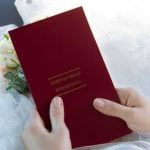Crafting the perfect wedding vows is a significant and deeply personal aspect of the marriage ceremony. Many couples grapple with the question: how long should wedding vows be?
The answer to this question is not always straightforward, as it involves considerations of tradition, personal preference, and the overall tone of the wedding. In this article, we will delve into the history and cultural significance of wedding vows, analyze modern trends in vow length, and provide expert advice on finding the ideal balance for your special day.
Wedding vows have been a key component of marriage ceremonies for centuries, serving as a public declaration of love, commitment, and promises between partners. Throughout history, these declarations have evolved in style and length, reflecting changes in societal norms and cultural traditions. Understanding the historical perspective of wedding vows can offer valuable insight into their significance and impact on the marital union.
As couples plan their weddings, they often look to various cultural influences for guidance on how long their vows should be. Different cultures have different traditions when it comes to vow length, with some favoring succinct declarations while others emphasize more elaborate expressions of love and commitment. By exploring traditional lengths in various cultures, couples can gain a deeper understanding of the options available to them as they embark on this important aspect of their nuptials.
Historical Perspective
Wedding vows have been a central part of marriage ceremonies for centuries, with their significance and content evolving over time. Historically, wedding vows often included promises of obedience and servitude, reflecting the traditional roles assigned to men and women within marriage. These vows were typically recited by the couple as dictated by religious or cultural customs, with little room for personalization.
However, as societal norms shifted and the concept of marriage became more centered on partnership and equality, the content and length of wedding vows also began to change. In many cultures, wedding vows have become more personalized and reflective of the unique love story and values of each couple. This shift has allowed for greater flexibility in vow length, with couples having the freedom to express their commitment in a way that feels authentic to them.
In recent years, there has been a growing trend towards shorter, more concise wedding vows that capture the essence of the couple’s promises without becoming overly verbose. However, some couples still opt for longer, more detailed vows that delve into specific memories, promises, and aspirations for their future together.
The ideal length for wedding vows ultimately depends on the preferences of the couple and the overall tone they wish to set for their ceremony. When considering how long should wedding vows be, it is important for couples to communicate openly with each other and possibly seek guidance from professionals to ensure that their vows effectively convey their love and commitment.
Traditional Length
When it comes to the typical length of wedding vows in various cultures, there is a wide range of customs and traditions to consider. In some cultures, such as Hindu weddings, the exchange of vows can be quite lengthy and detailed, often including promises and commitments that are recited by both the bride and groom. On the other hand, in Western cultures like in the United States and Europe, traditional wedding vows tend to be shorter and more standardized.
Here are some examples of typical lengths of wedding vows in various cultures:
- Hindu Weddings: In Hindu ceremonies, wedding vows known as “Saptapadi” can comprise of seven steps or promises that the couple takes while circling around a holy fire. These vows can be quite extensive and may include specific commitments related to mutual respect, care for family members, and support for each other’s goals.
- Christian Weddings: Traditional Christian wedding vows are relatively short and simple, often including phrases like “to have and to hold from this day forward” or “for better or for worse” to symbolize a lifetime commitment. The emphasis is on timeless declarations of love and fidelity within a concise format.
- Native American Weddings: In Native American ceremonies, traditional wedding vows may involve rituals that express reverence for nature and community. Vows may be spoken through storytelling or poetry with vivid imagery evoking their cultural heritage.
Ultimately, the ideal length of wedding vows should reflect the values and beliefs of the couple getting married. Whether long or short, what matters most is that the words spoken are sincere reflections of the couple’s commitment to each other. And while it’s important to honor tradition, couples should feel empowered to personalize their vows based on what feels authentic to them.
Modern Trends
When it comes to modern trends in wedding vow length, couples are increasingly transitioning from traditional, standard-length vows to more personalized and unique expressions of their love and commitment. In today’s weddings, there is no one-size-fits-all approach to writing vows, with many couples opting for shorter, more concise declarations or longer, more detailed promises.
This shift reflects a desire for authenticity and individuality in the wedding ceremony, as couples seek to personalize every aspect of their special day.
To understand the current trends in wedding vow length, it’s important to consider the factors that influence this decision. With the rise of social media and personalized wedding websites, couples are often inspired by the creativity and uniqueness of others’ vows. Additionally, as couples continue to prioritize intimate and meaningful ceremonies over traditional formalities, they are looking for ways to make their vows truly reflect their relationship.
In terms of modern trends, one option that has gained popularity is the use of non-traditional formats for wedding vows. This can include incorporating anecdotes or storytelling into the vows, using humor or even including personal promises or shared activities. The use of multimedia such as videos or slideshows during the ceremony has also influenced couples to create shorter vows so as not to overwhelm guests with lengthy speeches.
On the other hand, some couples find that longer vows allow them to express their feelings more deeply and create a truly memorable moment during the ceremony. Ultimately, exploring these modern trends can help couples determine what type of vow length best suits their personalities and vision for their wedding day.
Writing Your Own Vows
When it comes to writing your own wedding vows, the first question that often arises is, “How long should wedding vows be?” The truth is, there’s no one-size-fits-all answer to this question. The length of your wedding vows ultimately depends on your personal preferences, as well as the guidelines set by your officiant or the traditions of your cultural or religious background.
While some couples may opt for short and sweet vows that get straight to the point, others may choose to express their love and commitment in more elaborate and detailed ways. A good rule of thumb is to aim for a length that feels comfortable for both you and your partner. If one of you prefers shorter vows while the other leans towards longer ones, finding a middle ground can help strike a balance.
When crafting your personalized wedding vows, consider the following tips and tricks:
1. Reflect on what marriage means to you: Before writing your vows, take some time to reflect on what marriage means to you personally. What are the most important values and promises you want to express to your partner?
2. Set the tone: Decide whether you want your vows to be lighthearted and humorous, heartfelt and emotional, or a combination of both. Setting the tone for your vows can help guide your writing process.
3. Practice out loud: Once you’ve written your vows, practice saying them out loud to gauge their length and flow. This will also help you determine if any edits or adjustments are needed.
As you navigate the process of writing your own wedding vows, remember that there’s no right or wrong answer when it comes to length. The most important thing is that your words come from the heart and authentically reflect your love for your partner.
| Tip | Description |
|---|---|
| Reflect on What Marriage Means | Take time to think about the values and promises important in marriage. |
| Set the Tone | Decide if you want lighthearted, emotional or mixed tones for your vows. |
| Practice Out Loud | Practice saying your vows aloud to determine their flow and length. |
Short vs Long Vows
When it comes to wedding vows, one of the most common questions that couples often ask is, “How long should wedding vows be?” The length of wedding vows can vary widely, and deciding whether to keep them short and sweet or go for a longer, more detailed expression of love can be a challenging decision for many couples.
In this section, we will explore the pros and cons of both shorter and longer wedding vows to help you determine which option might be best for your special day.
Shorter Vows
Short wedding vows are concise and to the point, typically consisting of just a few sentences or a brief paragraph. One of the main advantages of short vows is that they are easy to remember, making it less likely for nerves to get in the way of delivering them confidently during the ceremony.
Additionally, shorter vows can be more impactful as they focus on key sentiments without getting bogged down in lengthy details. On the other hand, some may feel that short vows don’t fully capture the depth and breadth of their emotions, leading them to opt for longer vows instead.
Longer Vows
In contrast, longer wedding vows offer couples the opportunity to express themselves in greater detail, allowing them to share more personal stories, memories, promises, and aspirations with each other and their guests. Longer vows can provide a sense of completeness and authenticity that some find deeply meaningful.
However, one potential downside is that longer vows may become too cumbersome or overwhelming if not carefully crafted. Additionally, there is a risk that guests may lose interest if the vows drag on excessively.
Ultimately, whether you choose shorter or longer wedding vows will depend on your personal preferences as a couple. It’s important to consider what feels most authentic and meaningful to you both while also taking into account the overall tone and flow of your ceremony. Remember that there is no right or wrong answer when it comes to vow length-what matters most is that your words come from the heart.
Expert Advice
When it comes to crafting the perfect wedding vows, seeking expert advice can be invaluable. Wedding planners, officiants, and marriage counselors are well-versed in the art of creating meaningful ceremonies and can offer valuable insights on determining the ideal length for your vows.
Consider the Ceremony Style
Different wedding ceremonies have different styles, and this can impact the ideal length of your vows. For example, if you are having a traditional religious ceremony, there may be specific guidelines or expectations for the length of your vows. On the other hand, if you are having a more modern or casual ceremony, you may have more freedom to choose the length that feels right for you.
Focus on Quality Over Quantity
One common piece of advice from wedding experts is to focus on quality over quantity when it comes to writing your vows. While there is no hard and fast rule about how long your vows should be, it’s important to make sure that every word is meaningful and heartfelt. Whether your vows are one minute or ten minutes long, the most important thing is that they authentically express your love and commitment to your partner.
Seek Input From Your Officiant
Your officiant can also provide valuable guidance on determining the ideal length for your wedding vows. They may have insights based on their experience and expertise that can help you decide whether shorter or longer vows would be best for your particular ceremony. Don’t hesitate to ask them for their input as you navigate this important decision.
As you consider how long should wedding vows be, remember that ultimately, the most important thing is that they reflect your love and commitment to each other in a way that feels authentic and meaningful to both you and your partner.
Final Thoughts
In conclusion, the length of wedding vows ultimately depends on the couple’s preferences and the tone they wish to set for their ceremony. Whether opting for traditional, short and sweet, or longer personalized vows, it is important to remember that each option has its own unique advantages.
Traditional vows offer a sense of familiarity and comfort, while shorter vows can be concise and impactful. On the other hand, longer personalized vows allow couples to express their thoughts and emotions in greater detail.
When writing your own vows, it is essential to consider the significance of the promises you are making to your partner. The process should be a reflection of your relationship and commitment to one another. With expert advice from wedding planners, officiants, and marriage counselors, you can gain valuable insights on finding the ideal length for your wedding vows. Ultimately, the length should be authentic and meaningful to you both as a couple.
In summary, there is no one-size-fits-all answer on how long wedding vows should be. As you prepare for your special day, take into account your personal preferences as well as cultural and religious traditions. With careful consideration and thoughtful planning, you will be able to find the perfect length that best suits your relationship and creates a memorable moment during your wedding ceremony.
Frequently Asked Questions
Is 3 Minutes Too Long for Vows?
In the context of wedding vows, 3 minutes might be considered too long. Vows are typically meant to be brief yet meaningful, so keeping them concise and focused is important.
How Many Sentences Should Vows Be?
There is no set rule for the number of sentences in wedding vows. It’s more about expressing heartfelt sentiments and promises to your partner rather than counting sentences. Just keep it sincere and personal.
What Do You Legally Have to Say in Wedding Vows?
Legally, wedding vows vary depending on local laws and customs. Generally, there are certain elements that may need to be included, such as an expression of intent to marry, a promise to love and support each other, and sometimes the exchange of rings. It’s important to check with your officiant or local marriage authorities for specific requirements.

Welcome to my blog about home and family. This blog is a place where I will share my thoughts, ideas, and experiences related to these important topics. I am a stay-at-home mom with two young children. I hope you enjoy reading it! and may find some helpful tips and ideas that will make your home and family life even better!





